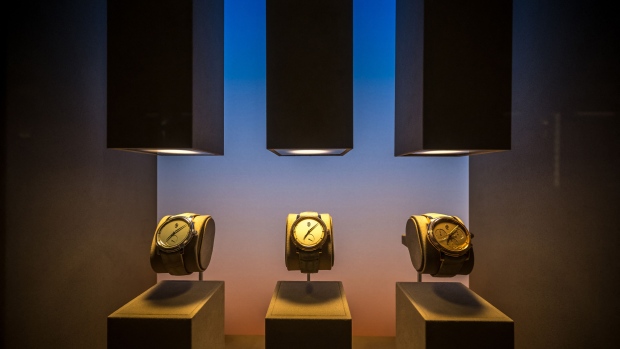Apr 17, 2024
Swiss Watchmakers Fear Retail Glut and Discounts After Boom
, Bloomberg News

(Bloomberg) -- Facing a drop in demand after the pandemic-era boom, Swiss watchmakers are bracing for a new challenge: retailers cutting prices to unload stock.
At a trade show in Geneva last week, chief executive officers of watch manufacturers said they will limit shipments to stores this year to counter a slowdown that has seen consumers rein in spending and second-hand prices tumble. They want to prevent retailers from becoming awash with inventory, which typically leads to discounting that can undermine a luxury watch brand’s image of exclusivity.
“I don’t ship if you haven’t sold out for the watch that you have on order. I don’t ship,” Guido Terreni, CEO of watchmaker Parmigiani Fleurier SA, told retailers at the Watches and Wonders trade fair. “This is extremely important because it helps our partners manage their cash but it also gives the right impression that you are not in front of a brand which is over-distributed.”
Edouard Meylan, the chief executive officer of H. Moser & Cie, also expects price cuts on stock. “In bad times you know it’s going to be discounted at some point,” he said.
Swiss watchmakers enjoyed a sales surge from 2021 until the middle of last year as cash-flush consumers, spurred by low interest rates, joined waiting lists for pricey timepieces and sent Swiss watch exports to record sales for three years straight.
But they’ve since suffered from a shift in consumer sentiment caused by shaky economic growth, soaring inflation and higher rates. That’s left retailers with too many watches and prices that rose sharply in recent years, due in part to the strong Swiss franc against other currencies.
“The hype is over because there is too much merchandise,” said Frank Müller, an industry consultant at Germany-based The Bridge to Luxury who previously ran the Swatch Group brand Glashütte Original.
“It’s also the industry’s fault for being less creative, less attentive to the consumer and being too aggressive in terms of commercial goals,” he added.
Slowing Growth
The economic downturn is prompting watchmakers to pencil in lower growth this year.
“We are anticipating non-growth or flattish growth,” said Terreni, who’s tripled sales since joining the brand in 2021 and steered the company to profitability after years of losses.
Parmigiani Fleurier introduced new models of its Toric dress watch last week, with prices starting at about 45,000 Swiss francs ($49,200). The watchmaker is owned by the foundation of the Sandoz family, which derived its fortune from pharmaceutical giant Novartis SA.
Terreni, who said his company now has internal software and an application showing how many of its watches remain in stock at its 80 retail partners, said price cuts by retailers can harm brands. “Selling is the cancer of watchmaking and it has always been like that,” he said. “It’s chronic and it is cyclical.”
Meylan said that after sales grew 50% in 2023, driven mainly by its Streamliner integrated bracelet sports watch, Moser expects only half that growth in 2024 as it curbs expansion to more retailers and controls shipments.
Analysts at Morgan Stanley said in a report last week that the Swiss watch industry, particularly smaller brands outside dominant marques including Rolex, Patek Philippe and Audemars Piguet, could suffer a double-digit decline in exports in 2024. The bank is forecasting that overall Swiss watch exports could decline 5% by value in 2024 after rising 7.7% in 2023 and 11.3% in 2022.
Meylan said he’s worried about retailers forcing customers to buy more watches in bundles in order to get their hands on the hardest-to-obtain timepieces from top brands such as Rolex and Patek Philippe. He fears the more attainable watches could then be dumped on the second-hand market for lower prices, harming brand value.
After launching the popular “Kermit” version of its ProPilot X watch in 2023, Oris, like most rival watchmakers, had a more subdued slate of new releases at this year’s show. The brand refined its flagship Aquis dive watch, which sells for between $2,700 and $4,200, to make it more comfortable with an improved bracelet.
“Everyone was conservative this year given the circumstances,” Oris Co-CEO Rolf Studer said in an interview.
Oris is anticipating single-digit sales growth in 2024, but the brand expects to benefit as some consumers look to buy more affordable watches.
“They’re shifting to substance,” Studer said. “The inflated situation is over.”
(Adds additional information on swiss watch exports.)
©2024 Bloomberg L.P.


